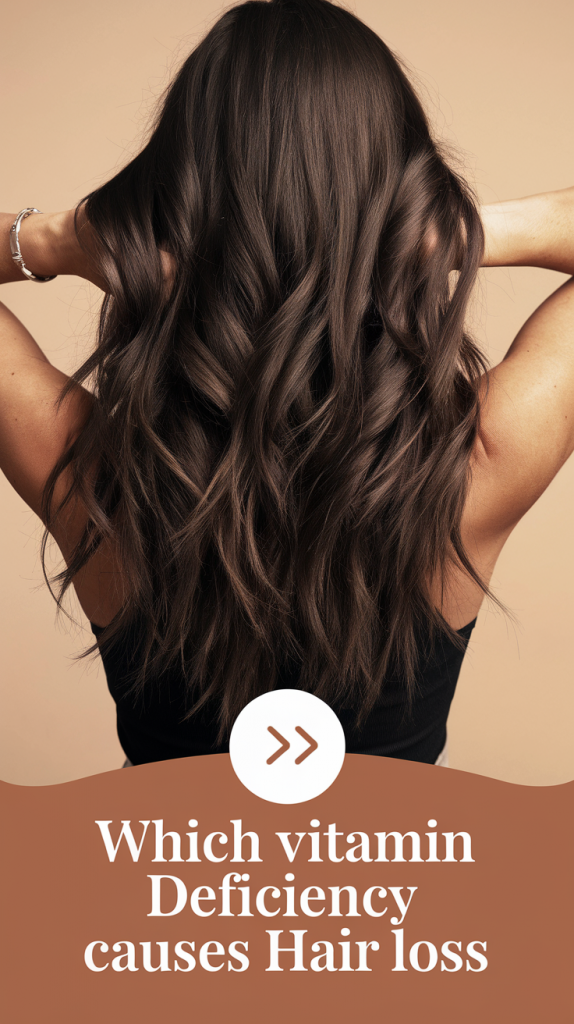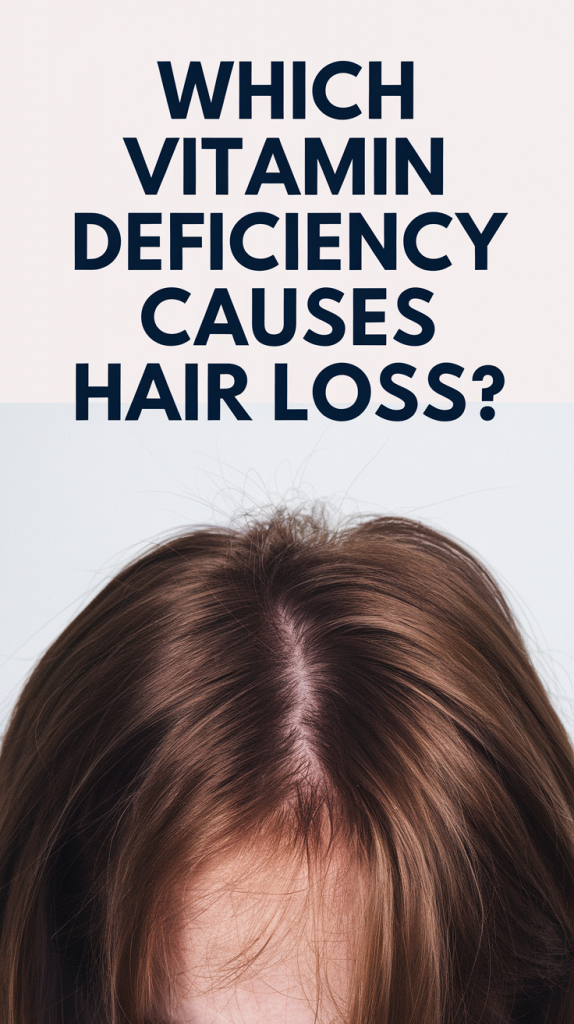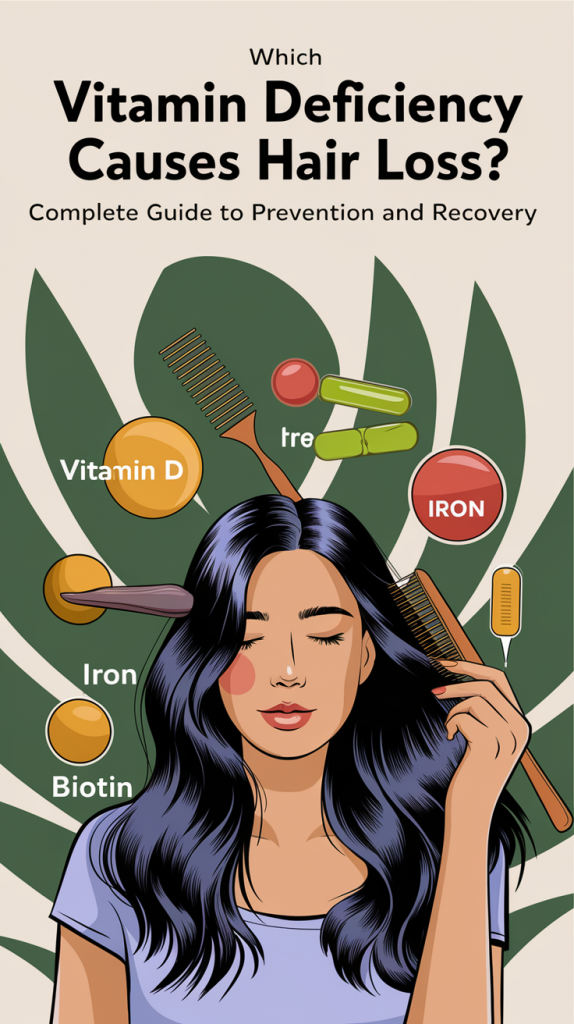Which Vitamin Deficiency Causes Hair Loss?
Have you ever noticed your hair thinning or falling out and wondered what might be causing it? Many people often overlook a critical factor: vitamin deficiencies. On my journey of learning about hair health, I realized how crucial a balanced diet and proper nutrition are for maintaining thick, healthy hair. In this article, we’ll explore which vitamin deficiencies are most commonly linked to hair loss, how to recognize the signs, and what you can do to restore your hair’s vitality.

The Connection Between Vitamins and Hair Health
Healthy hair isn’t just about good genes or the right shampoo—your body needs the right nutrients to support growth and strength. Vitamins are vital for cell regeneration, protein synthesis, and maintaining healthy scalp conditions. When your body lacks these nutrients, your hair follicles can weaken, leading to increased shedding or even bald patches.
Key Vitamin Deficiencies That Lead to Hair Loss
Vitamin D Deficiency
- Role in Hair Health:
Vitamin D stimulates hair follicles and helps initiate the growth cycle. Without it, new hair may struggle to grow, causing thinning. - Symptoms of Deficiency:
Fatigue, bone pain, muscle weakness, and hair shedding. - Sources:
Fatty fish, fortified dairy products, egg yolks, and sunlight. - Table: Foods Rich in Vitamin D
Food Item Vitamin D Content (IU per serving) Salmon (3 oz) 570 Fortified Milk 100 Egg Yolk 41
Iron Deficiency

- Role in Hair Health:
Iron helps transport oxygen to hair follicles. Without sufficient oxygen, hair growth slows, and shedding increases. - Symptoms of Deficiency:
Pale skin, fatigue, dizziness, brittle nails, and hair thinning. - Sources:
Red meat, lentils, spinach, and iron-fortified cereals. - Table: Iron-Rich Foods and Their Benefits
Food Item Iron Content (mg per serving) Benefits for Hair Lentils (1 cup) 6.6 Strengthens hair roots Spinach (1 cup) 3.5 Improves oxygen delivery Beef (3 oz) 2.7 Boosts scalp health
Biotin (Vitamin B7) Deficiency

- Role in Hair Health:
Biotin supports keratin production, the building block of hair, skin, and nails. - Symptoms of Deficiency:
Hair breakage, brittle nails, and dry skin. - Sources:
Egg yolks, almonds, seeds, and leafy greens.
Vitamin B12 Deficiency
- Role in Hair Health:
Vitamin B12 is essential for red blood cell production, which supports oxygen flow to the scalp. - Symptoms of Deficiency:
Memory problems, numbness, and hair thinning. - Sources:
Meat, eggs, dairy, and fortified cereals.
Beyond Vitamins: Other Nutrients for Hair Health

While vitamins play a starring role, other nutrients are also critical for maintaining hair health:
- Zinc: Repairs hair tissues and keeps the oil glands around follicles working properly.
- Sources: Oysters, pumpkin seeds, and beef.
- Omega-3 Fatty Acids: Keep the scalp hydrated and support strong, shiny hair.
- Sources: Fatty fish, flaxseeds, and walnuts.
- Selenium: Prevents scalp infections and protects hair follicles from oxidative stress.
- Sources: Brazil nuts and seafood.
How to Diagnose Vitamin Deficiencies
If you’re experiencing hair loss, identifying a vitamin deficiency early is key to reversing the damage. Healthcare professionals often recommend the following tests:
- Vitamin D Test: 25-hydroxyvitamin D blood test.
- Iron Test: Ferritin blood test to check stored iron.
- Vitamin B12 Test: Serum B12 level analysis.
- Zinc Test: Plasma zinc concentration test.
Preventing Hair Loss Through Diet and Lifestyle

Dietary Tips for Healthy Hair
- Balance Your Plate: Include protein, healthy fats, and vitamins in every meal.
- Pair Nutrients for Absorption: Combine iron-rich foods with vitamin C sources, like spinach with oranges.
- Hydrate: Drink plenty of water to support overall scalp health.
Lifestyle Changes
- Manage stress through yoga or meditation, as chronic stress can deplete nutrients like zinc and vitamin B.
- Avoid smoking and alcohol, which can impair vitamin absorption.
- Get adequate sunlight for natural vitamin D synthesis.
Risks of Over-Supplementation
While correcting deficiencies is essential, too much of a good thing can be harmful.
- Vitamin A Overdose: Can lead to hair thinning.
- Iron Overload: May cause oxidative stress, damaging hair follicles.
Always consult a doctor before starting supplements.
FAQs
1. Can hair regrow after addressing vitamin deficiencies?
Yes, hair regrowth is possible, but it may take several months of consistent treatment and dietary changes.
2. Which vitamin deficiency causes the most severe hair loss?
Vitamin D and iron deficiencies are the most common culprits linked to severe hair shedding.
3. Are supplements necessary to prevent hair loss?
Supplements are beneficial if you have a confirmed deficiency, but a balanced diet is often sufficient.
4. How long does it take to see results after correcting a deficiency?
Visible improvement can take 3-6 months, as hair growth cycles are slow.
5. What are the best foods for preventing hair loss?
Foods like salmon, spinach, eggs, lentils, and almonds are excellent choices for promoting healthy hair.
Conclusion
In my experience, understanding the role of vitamins in hair health is a game changer. Deficiencies in key vitamins like D, B12, biotin, and iron can wreak havoc on your hair, but the good news is that these issues are often reversible with the right approach. By adopting a nutrient-rich diet, making healthy lifestyle changes, and addressing deficiencies early, you can reclaim your hair’s strength and vitality. Remember, your hair is a reflection of your overall health—nourish your body, and it will show.



